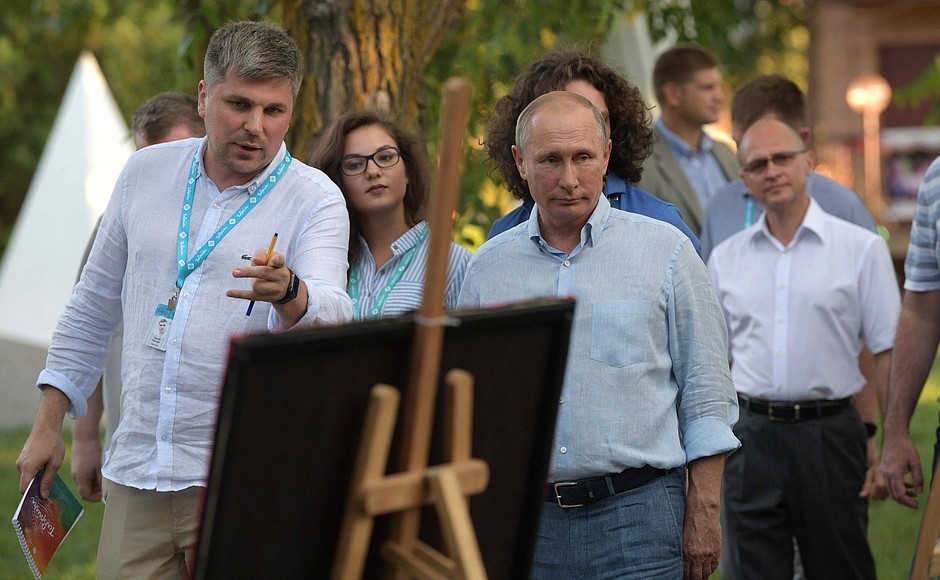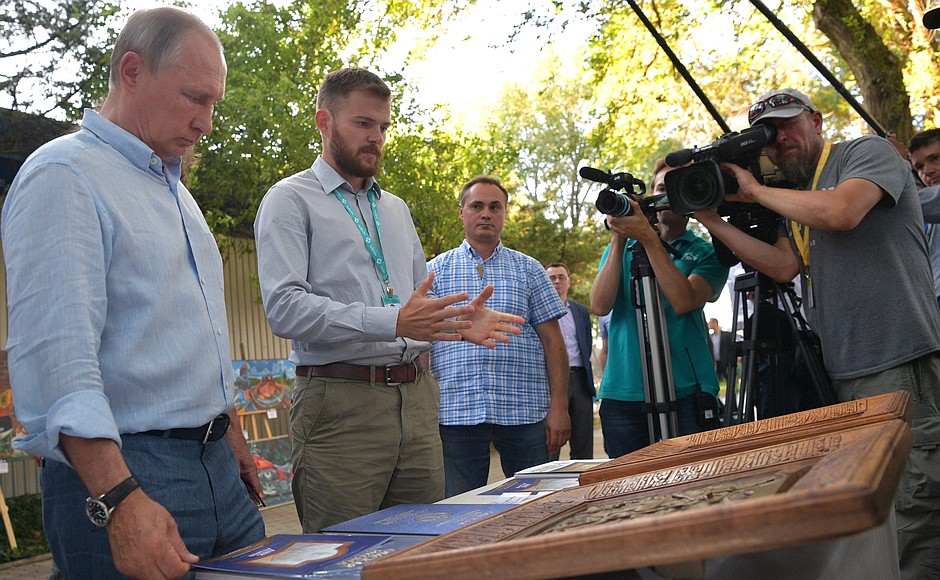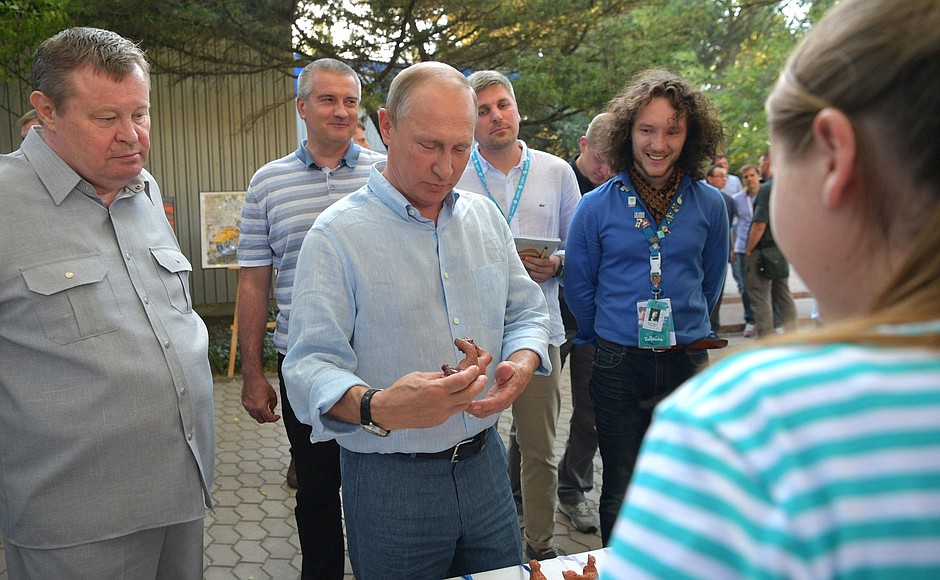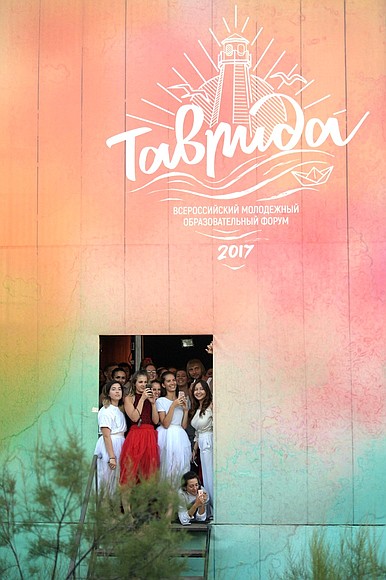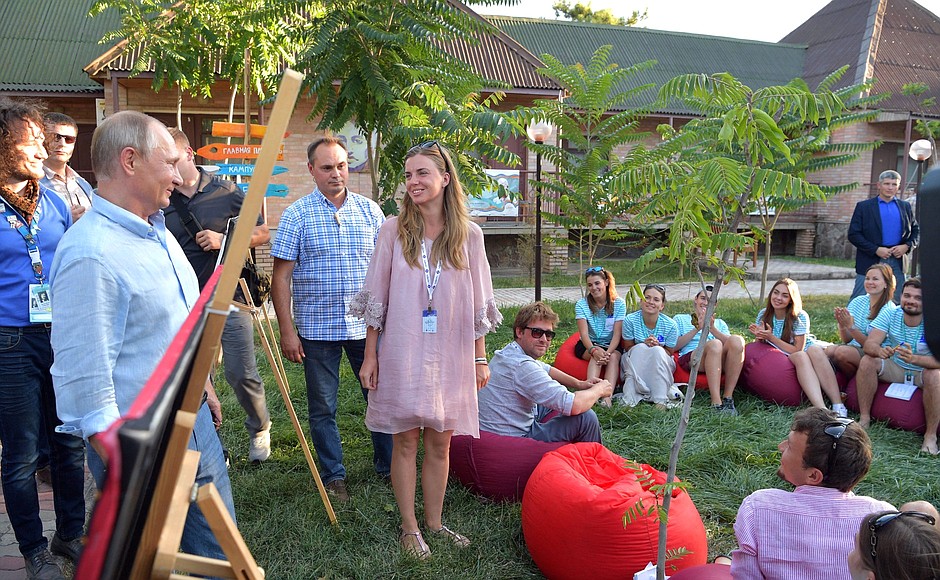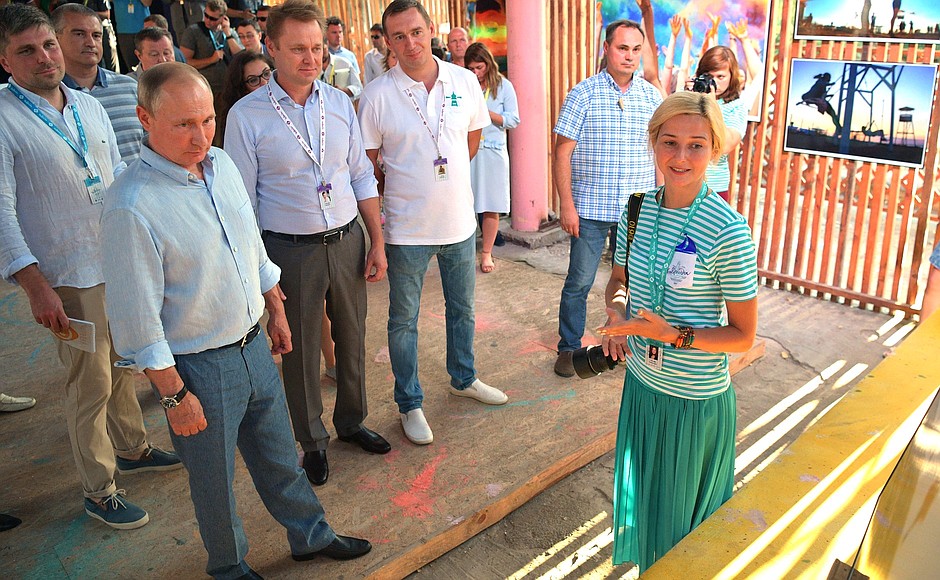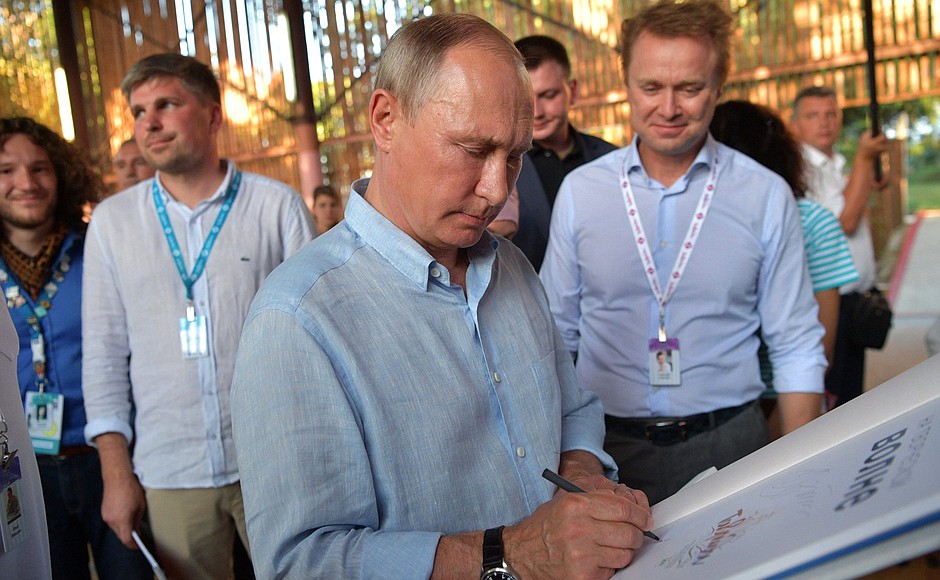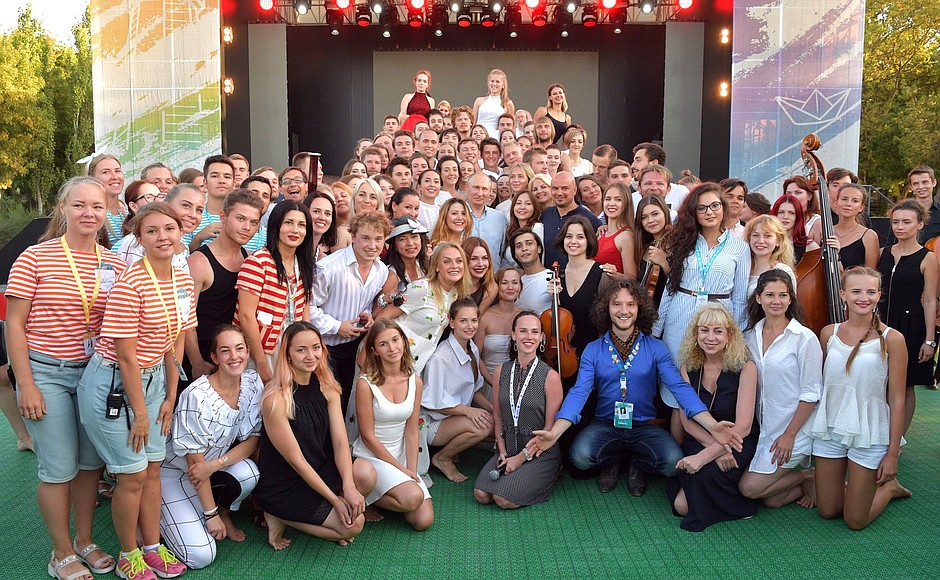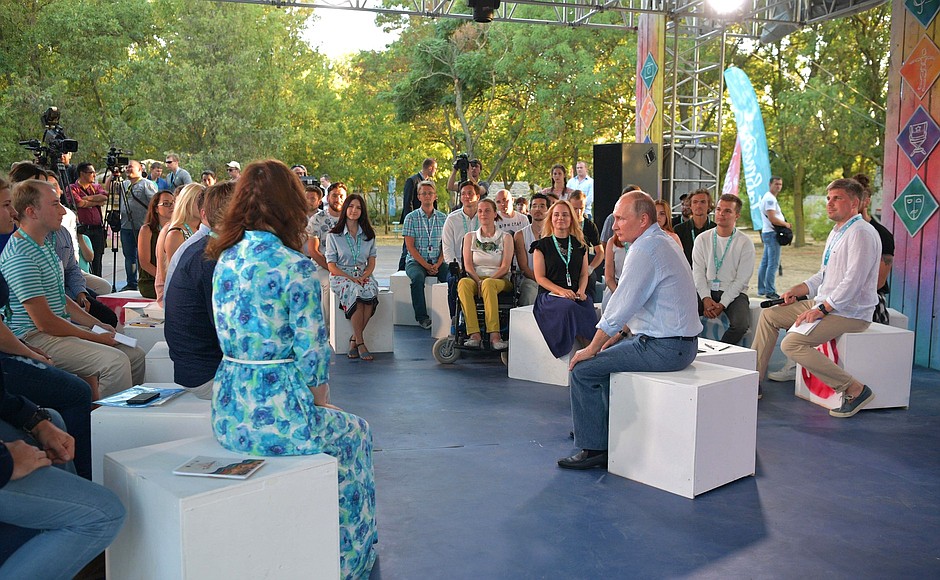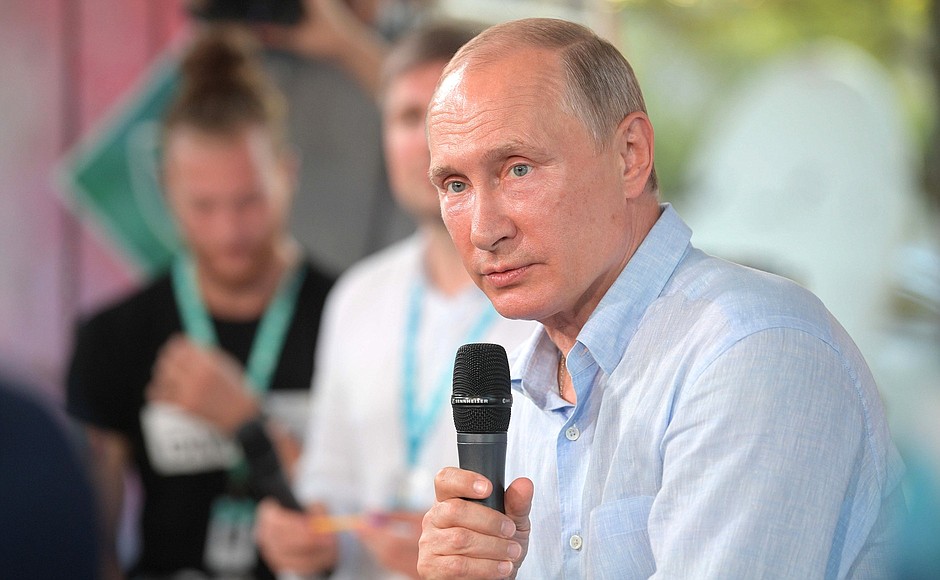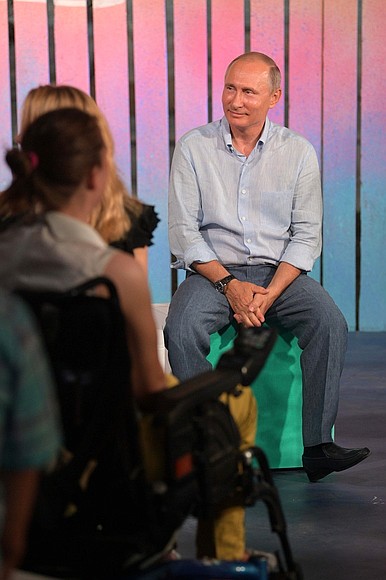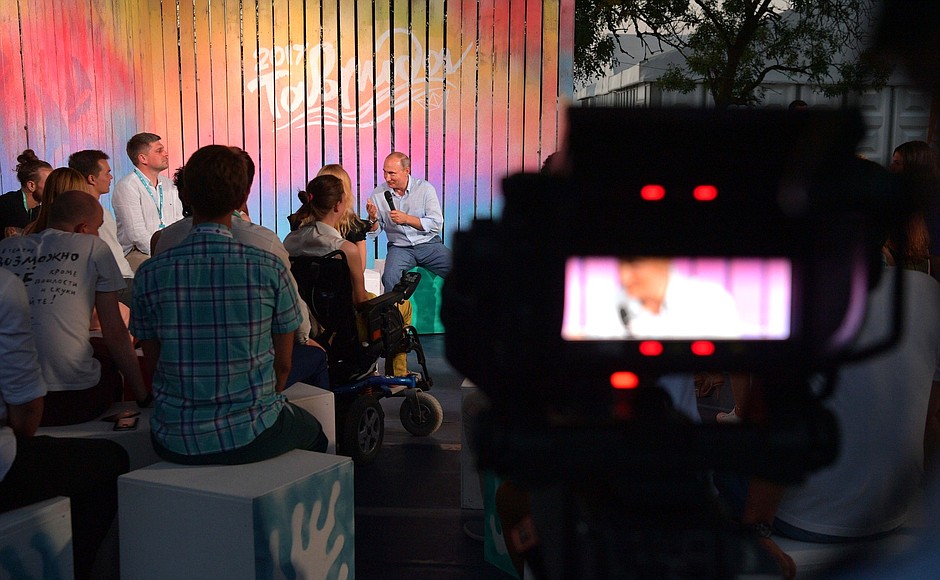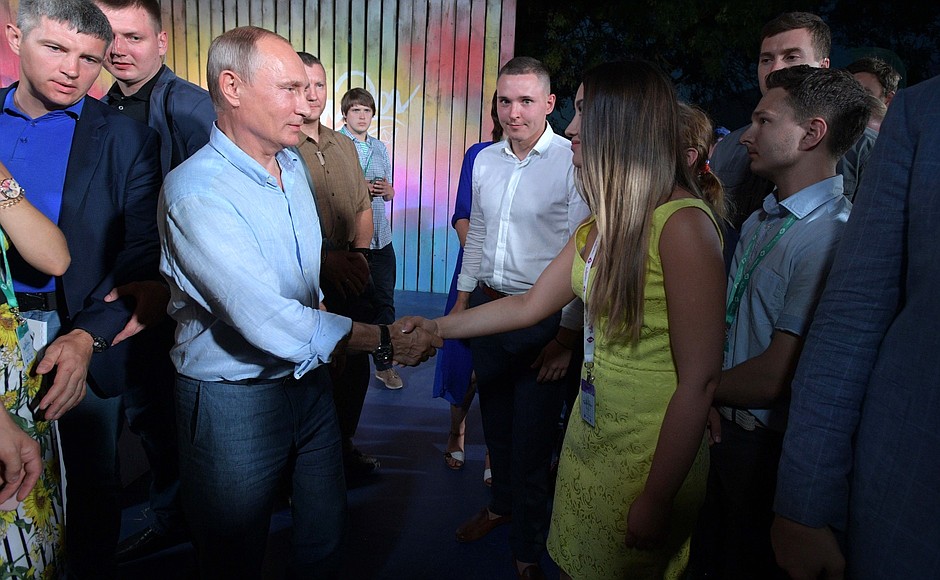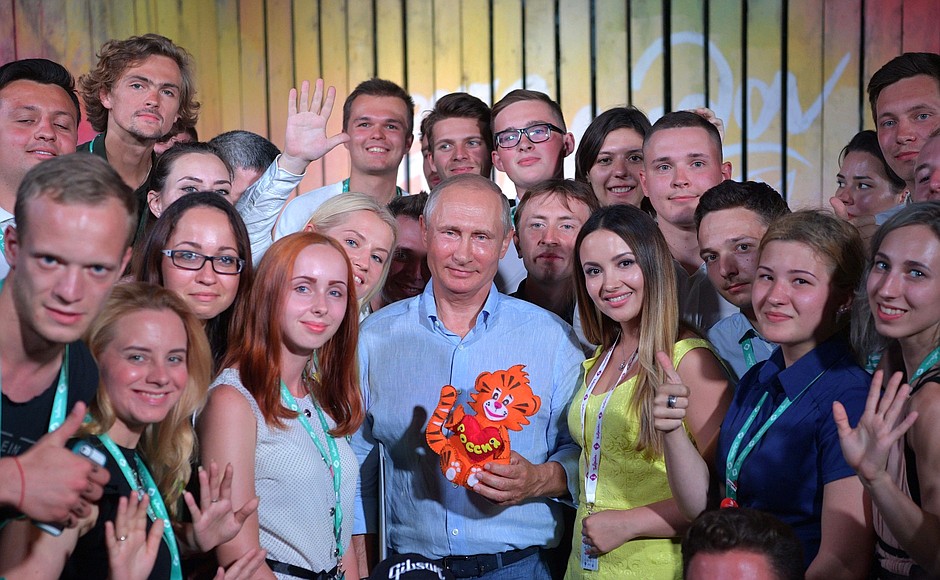The President was introduced to thematic exhibitions of various creative teams, photo artists, architects and urban designers. The President spoke in an informal setting with both organisers and participants of the annual forum. The Tavrida National Youth Educational Forum is taking place in Crimea for the third time. It traditionally brings together talented young people and experts from various fields – design, architecture, literature, history, fine arts, music, cinema, cartoon animation, journalism, and museum studies. The event aims to form professional communities comprised of creative young people.
The forum is organised by the Federal Agency for Youth Affairs and the Russian Centre for Civil and Patriotic Education of Children and Youth (Rospatriottsentr) together with the Moscow State Institute of Culture.
* * *
Transcript of the meeting with organisers and participants of the Tavrida National Youth Educational Forum
President of Russia Vladimir Putin: Good afternoon.
I already have a general idea of what this forum is about. Now I hope to hear more details from you. At any rate, what I have seen here is very interesting and impressive. Most importantly, I think the participants like it.
Let us start. Please.
Anton Chubakov: Good afternoon.
My name is Anton Chubakov, I am from Tula. I am a trained artist and painter. Here at Tavrida, I am presenting the project, Samovar: the 21st Century Flea.
I have a question related to my occupation. These days, if you want to become a professional artist, it takes you 15 years to study, first at an arts school, then college and university. Then artists start looking for a job all by themselves.
In the Soviet times, graduate artists would go to the Union of Artists with its art factories where they could get hired to work for the country.
Mr Putin, I would like to ask your opinion. Is it possible to bring back this tradition? And is it possible to serve your country through art?
Vladimir Putin: I have to admit I was unaware of the fact that art factories ceased to exist. Of course, we should think about this because art is a special activity.
Art is not something that can conform and fit into certain boundaries. However, it needs support. I see your point and I have friends who are involved in the arts.
I know how difficult it can be to find clients. I understand you need stability. I will discuss it with my colleagues, including those at the Ministry of Culture. I think it is possible to create something similar.
Andrei Grigoryev: Good afternoon, Mr Putin.
My name is Andrei Grigoryev, I am from Yekaterinburg. I am a student of the world-famous Nikolai Kolyada, creator of the Kolyada Theatre. He sends you his best.
Recently we shot a film about Nikolai Vasenin – a war hero, a member of the French resistance. You may have heard the story; we were very well supported by people in culture and the arts. Money was raised through crowd funding. And Sergei Lavrov even recorded a video message in support of our project.
So the film was shot and had success. We premiered the film in 57 cities and even received a presidential grant. The Russian Copper Company sponsored the project. Igor Altushkin fell in love with the life story of Nikolai Vasenin and was devoted to the success of our film crew and supported this project until the end. We are still involved with this film and, of course, we support the memory of Nikolai Vasenin.
I do not think I should retell the whole story, but what is important? I would like to note that Vasenin is my third film, I finished it, and now I am working on a feature film. It is a film about Grigory Perelman, the well-known mathematician, the pride and really the crown jewel of the maths world.
We developed this project for a year, wished Mr Perelman a happy 50th birthday with an orchestra under his windows – maybe somewhat odd, but it was cool actually. And on June 8, we managed to meet him in person.
Vladimir Putin: I would say that was a huge success for you.
Andrei Grigoryev: It really was a huge success.
Vladimir Putin: I understand he leads a reclusive life.
Andrei Grigoryev: Reclusive, yes.
If you like, you can open the materials and look them through now, while I talk.
We achieved a lot. And now we are moving on to the production stage. So, we would like to ask you (not for money)… We would like you to write a letter of recommendation to the Ministry of Culture, because such letters are very welcome.
And if we have your appraisal, you are the number one viewer in this country, and the success of Panfilov’s 28 Men and the success of Legend No 17 and many other films, in many respects, it seems to me, is owed to you. So, look through the materials, if you will; this is a young actor of the Kolyada Theatre.
Vladimir Putin: But why is it written here “the luckiest mathematician”? He is the most talented, the greatest genius, perhaps?
Andrei Grigoryev: That he is talented and a genius goes without question.
He used the money he got from the Courant University to prove the Poincare Conjecture. This was really phenomenal, because grants worth millions were being paid around the world and this conjecture remained an enigma to people for 98 years, but today, we have the chance to see the world in four-dimensional space.
More time will probably be needed to fully understand the implications of what he has achieved. Like with credit card algorithms, no one understood why mathematicians thought them up, but it happened. We want to ask you directly to come to the premiere, to support our film, and if you can – everything is set out in detail there – to sign a letter of reference.
Vladimir Putin: What about Grigory Perelman himself…
Andrei Grigoryev: He heard out our explanations of the whole project and had no objections.
Vladimir Putin: He has no objections…
Andrei Grigoryev: I also spoke to Sergei Yevgenyevich, his teacher.
Vladimir Putin: Yes, but the main thing is that he supports the project, that he has no objections.
Andrei Grigoryev: Yes, of course, because two films have already been made about Hawking, and about Steve Jobbs…
Vladimir Putin: You are absolutely right, and I fully support you, but you must get his permission.
Andrei Grigoryev: Of course. I can say from the outset that he is not going to sign anything. Our task is to ensure that our artistic interpretation of his life is as objective as possible. I will do everything to ensure this. We have already written the screenplay.
Vladimir Putin: You are quite right and I support you completely.
Andrei Grigoryev: Will you come to the premiere?
Vladimir Putin: I will try.
Andrei Grigoryev: Thank you. That would be great.
Vladimir Putin: I do not know yet when your premiere will take place and where I will be at that moment.
Andrei Grigoryev: June 13, 2019, 664 days from now. It says so here. The photo shows Alexei Romanov, an actor from Kolyada Theatre.
Vladimir Putin: Will Perelman himself attend?
Andrei Grigoryev: I certainly hope so.
Sergei Pershin: Friends, let us move from cinema to theatre. If there are no objections, I would like to give the young culture representatives here in our improvised hall the chance to speak.
Vladimir Putin: Were the previous speakers not young?
Sergei Pershin: Yes, they are young too, like everyone who takes part in our forum each year. But they already have achievements to their names.
Daniil Chashchin: Good afternoon, Mr Putin.
My name is Daniil Chashchin and I am from Tyumen. I am a theatre and film director and so my question will concern this area of activity. This is quite a pressing issue that the Tavrida forum has discussed over the last three years and it comes up constantly in theatre and film education too, backed by rectors and the leading theatre and cinema teachers, but it does not translate into direct instructions.
The issue is that of giving people who already have higher education the chance to train as directors. The specific nature of a director’s work requires a certain life and professional experience, as well as an artist’s, choreographer’s, musician’s and actor’s skills.
Many of our great directors such as Yury Lyubimov or Vasily Shukshin only entered the profession when they were well over thirty and had previously worked in other professions. I often travel the provinces staging shows, and I know a huge number of talented and creative people who already have a higher education. They ask me how one goes about becoming a director, and I say, “Unless you have 300,000, it’s impossible”.
I believe that art is built on personality, and the director is the main personality, the one who organises the whole process. If we no longer have outstanding personalities, we will see a correspondingly different level in our cinema and theatre.
My question is, Mr President, would it be possible to resolve this problem through the system of presidential grants?
Vladimir Putin: Yes, of course. These grants are already in operation, and I think they apply to this area as well.
Daniil Chashchin: I have not yet heard anything.
Vladimir Putin: The current legislation makes it possible to receive only one state-funded (free) higher education. This is the truth of the situation, but it is possible to make special provisions in the grant system. In other words, the system is already up and running and we just need to see whether it currently applies to this area of activity or not.
I know the Culture Ministry has already raised this issue and I support them. I do not think the sums in question are so large. This is a case-by-case situation. You are right, directors are unique products, and so, of course, we can do something here. We support this idea and will see that it goes ahead.
Daniil Chashchin: Thank you very much.
I believe there are many people listening and applauding this decision of yours right now. Thank you.
Sergei Pershin: To the new Shukshins.
Incidentally, on the subject of grants, you came to us last year…
Vladimir Putin: Today, by the way, one of our outstanding directors, Andrei Konchalovsky, is celebrating his 80th birthday. Let us give him a round of applause and congratulate him. (Applause.)
Sergei Pershin: He has just put together a new group of students at GITIS [Russian Academy of Theatre Arts].
As concerns grants, another Tavrida grantee is a person you supported last year. I would like him to say a few words. His name is Alexei, and he represents a community of architects and the Moscow Institute of Architecture. He developed a Kremlin renovation project. Can you tell us a little more about it?
Alexei Kapustin: Good afternoon, Mr President.
Vladimir Putin: Will I have to relocate for the renovation? Or can I stay in my office?
Alexei Kapustin: No, relocation is not necessary. (Laughter)
Our project concerns the restoration of the Chudov Monastery and the Ascension Convent on the site of demolished Building 14. We showed you this project last year and, having received the grant, we completed it. It was actually your idea, you voiced it in 2014, and we started working on it almost immediately.
Our approach went beyond simple restoration of architectural monuments. The goal is to revive Russian national culture reflected in architecture; that is, not only to restore the past, but to create the future on the firm foundation of our great history, which is equally important. You also mentioned that this project needs promotion.
Vladimir Putin: Are you an architect?
Alexei Kapustin: Yes.
Vladimir Putin: You speak like a writer or a poet. It is a pleasure to listen to you.
Alexei Kapustin: Thank you.
You said that the project needs to be put out for public discussion, which we tried to do. It has featured in two documentaries on federal channels. We gave an interview and presented the project at some of the most prestigious architectural conferences. We also produced a book, and I would like to give you a copy.
This book describes how the project uses a combination of modern computer technology and traditional practices of classical restoration schools. Recently we showed this project to Patriarch Kirill, and he said that it was very important and supported it.
Moreover, this project became, if I may say so, an element of Russia’s soft power abroad. Just recently, the government of Republika Srpska within Bosnia and Herzegovina decided to use one of the churches from the project as a prototype for their church devoted to the Romanov family in the capital, Banja Luka. With support of the Sretensky Monastery in Moscow, we have already agreed on this with the eparchy and got approval for the project.
Mr Putin, on behalf of our team, I would like to say that we want to continue working on this project and, if possible and upon your instruction, to present it officially to the public. After that, if possible, we could start bringing it to life.
I believe this project could cultivate a new generation of architects who will not only be a creative but also an important, patriotic and spiritual elite. Russian architecture has always flourished and thrived intellectually in conditions like these.
Vladimir Putin: Alexei, I like this idea very much. The only constraining factor is the opinion of your colleagues and experts in history, architecture and archeology. Many say, ”You should not touch this. No new-builds should appear at the Kremlin. As good as it may be, it will still look like a new-build against the background of ancient preserved churches.“ This is the first factor.
Secondly, this concerns a place where excavations are considered necessary by archaeologists. Overall, this is an issue for discussion; it cannot be approved by a sole authority, this has to be a sustained decision expressed by the public – either to recreate what used to be in this place or to preserve what we have. But the decision can be made only on the basis of an extensive public discussion.
The idea itself is appealing; it would be good to revive what we lost. The question is whether we can leave unharmed the things we have preserved while restoring the ones we lost. Let us think about it together.
Sergei Pershin: The forum here is open to people with different abilities, including those with unlimited abilities, and we are proud of this. Some things are far from perfect as regards architecture and accessibility, but we are working on it.
I would like to give Svetlana the opportunity to ask her question, she is raising her hand.
Svetlana Kozinova: Thank you, Sergei.
Good afternoon, Mr Putin. I have been waiting for this meeting for three years, to personally thank you for the peaceful skies and the opportunity for us, creative people, to do what we love. Thank you very much for this. Our grandparents, sadly, did not have such an opportunity. But back to the point. I am Sveta Kozinova, a fashion designer from Moscow. As you can see, I represent a rather small group of Russian citizens of about 13 million people. There is a problem – no one creates stylish and comfortable clothing for us.
Vladimir Putin: See the irony? 13 million is almost ten percent of our population.
Svetlana Kozinova: It is neither few nor many. Unfortunately, the number is growing among young people and adults, no one is immune to that. No one creates stylish and comfortable clothes for us, and no one considers our opinion.
At this forum, after speaking to experts, we have come to the conclusion that it is time to change the situation and to act. This is why we have launched a project that allows over 250 disabled people from Russia to engage in designing and creating a full-cycle inclusive clothing collection.
I would like to ask you, as the most popular person in Russian and world media, and your team to take part in this project and support it in various ways.
Vladimir Putin: You mentioned this at just the right time, and here is why. The Government is working on a corresponding document, a strategy, but it is very specific and related to the support of production facilities manufacturing rehabilitation equipment for people with physical disabilities.
This issue can and definitely should be included in the strategy. I believe some considerable financing has been envisaged for two or three years – up to 1.5 billion for a start, so we will definitely include your issue there as well.
Svetlana Kozinova: Can I ask one more question? Aside from financial support, which is important, are you, as the leader of our country, prepared to take part in an advertising campaign for this clothing?
Vladimir Putin: For this clothing, I am.
Svetlana Kozinova: Thank you very much!
Sergei Pershin: Actually, new people have come this year ‒ young fashion designers. And to make it fair, Valeriya, any questions?
Valeriya Yefanova: Good afternoon! I am from Yaroslavl. My name is Valeriya, and I am a designer of women's clothing. I have a question about style.
Vladimir Putin: By the way, I will not advertise anything anymore. (Laughing.)
Valeriya Yefanova: No, I will not ask for advertising.
I have a question about your style. Looking at old photos, we always notice that not just our inner world changes but also our appearance. So, what can you say about your style? How do you see it? How did it evolve with your personal growth?
Vladimir Putin: You know, we hardly notice anything about ourselves. We look at ourselves in the mirror every day. Therefore, if we compare ourselves now with 10, 15, 20 or more years ago, then, probably, we can see a difference, but it happens easily and imperceptibly. I have the simplest style – a business one. I almost never go anywhere except my office. Sometimes I come to the Tavrida Forum.
Valeriya Yefanova: But your style is recognisable.
Vladimir Putin: I think that all people who are engaged in the same business have quite the same style.
In everyday life, I try to dress down, like now, to feel more comfortable. Of course, I want to look both dignified and handsome. I do not know what kind of style that is. As a rule, I just open my wardrobe and get dressed. Of course, I try to look decent, as cameras are on and millions of people watch me. Of course, I must look decent.
There is such a word – to bother. I do not bother with fashion Although I admit that this is very important, I agree. Especially when it comes to women's clothing, it is certainly an art. It took me quite a long time to understand this.
I can tell you about the evolution of my own views on clothes. As for architecture, art, music and theatre – that was all quite clear When I was a student, I did not think much about it.
But now I think this is an art, a creative process, and it is important as it creates our environment. And it is very important what environment we live in. So I wish you success.
Valeriya Yefanova: Thank you. Likewise.
Sergei Pershin: To respect the gender balance and give the different industries a chance to speak, I suggest that you speak, Georgy, if you have no objections. Georgy Fyodorov, from the music industry.
Georgy Fyodorov: Good afternoon Mr Putin. I am Georgy Fyodorov, a composer from St Petersburg State Conservatory and artistic director of a symphony orchestra.
Vladimir Putin: Super. How old are you?
Georgy Fyodorov: 22.
Vladimir Putin: Well, that is really something.
Georgy Fyodorov: I have been involved in this for five years now.
Vladimir Putin: Do you have a full-fledged orchestra?
Georgy Fyodorov: With varying success. (Laughter)
Vladimir Putin: With varying make-up or varying success? Not all here are musicians, but in general, a classic orchestra has 120 members.
Georgy Fyodorov: There are chamber orchestras as well, with 30–40 people.
Vladimir Putin: And is yours a big orchestra or the chamber variety?
Georgy Fyodorov: Mine is the chamber variety for now.
Vladimir Putin: A chamber orchestra is not bad either. Having 30–40 people, that is quite something too.
Georgy Fyodorov: I organised a mission with my orchestra. Thanks to Tavrida, this excellent forum, and the grant application process, we were able to obtain a grant to finance our development. We now plan to organise concerts targeting young audiences with little previous knowledge of classical music. We will play classical music that will draw them in and gain their interest. We plan to grab the public’s attention by describing works very vividly and emotionally, to get them interested in this culture, in Russian culture, including contemporary Russian culture. We want to make it interesting for them.
I would very much like to expand this project. Perhaps similar orchestras could be established in other cities as well to organise concerts that would make the public more involved in the world of classical music. This is a great undertaking and I think a noble one. This is a great responsibility as well.
So here is my question. You are the ‘artistic director’ of the largest ‘orchestra’ in the world.
Vladimir Putin: Xi Jinping leads the largest ‘orchestra’ in the world.
Georgy Fyodorov: Your ‘orchestra’ has the largest area.
Vladimir Putin: The largest area, yes.
Georgy Fyodorov: The largest area, no doubt. So, I have my question here somewhere. What is it like to be the ‘artistic director’ of such a large ‘orchestra’, the largest country in the world?
Vladimir Putin: He is reading from the score.
Georgy Fyodorov: And what is most important in conducting this ‘orchestra’?
Yes, I wrote it down on my music paper because it is the only paper I carry around. Thank you.
Vladimir Putin: The most important things in my ‘orchestra’ are integrity and love for those you work for and for your job. Without that, it would be absolutely impossible to achieve any success. I can see you love your job, which is a great advantage on your side.
On the other hand, I think that among those in music, you very rarely see consumer behaviour. People in music are usually very gifted, they live in their own world, the world of sound, at least to a significant extent.
There are architects and painters here in the audience. They represent fine arts. But music, you cannot see it, you can only hear it. It always evokes different feelings in people. Only geniuses and talented people have it in them to play beautifully and tug on people’s heartstrings. During my visit to Sirius, I already said that one of my musician friends says that every year dozens and even hundreds of composers graduate around the world. How many years has serious music been composed? Maybe 250 or 300. Still, only 50 or 60 composers are performed in the world. Where are the others? Every year they graduate, they work hard and write music every day. For almost 250 or 300 years, they have been composing serious music and still, only 60 of them get performed, including at least 10 or 15 Russian composers. I hope you and your colleagues will be among them.
Georgy Fyodorov: Thank you very much. Please come to our concerts.
Vladimir Putin: Thank you very much. Good luck.
I would like to comment on your plans, which are quite good.
I sincerely wish you luck, and not only in promoting music itself but in promoting Russian arts in general. We must not only speak about music but also remember the people who created it, the composers and the conditions in which they worked, both Russians and foreigners. Many stories like these are very educative, especially for young people. Do you know about Schubert’s fate? Schubert. Well, he was very young and died at 31, I think.
Georgy Fyodorov: Thirty-one.
Vladimir Putin: Thirty-one. He was unlucky in relationships with women. So, once he went to certain female service providers, caught a nasty disease and died. He was a genius composer – and what an irony of fate, a tragedy. That was one era with its people and fates. Now, the Great Patriotic War, when Shostakovich’s Symphony No. 7 was created. I know the story very well as I am from Leningrad, or St Petersburg, and everybody there knows it. Well, you do, too. But not everybody in this country, especially young people. And these stories of how music pieces were created must be told. It is very interesting, informative and educational. I wish you good luck.
Sergei Pershin: Actually, we had musicologists come this year to the forum’s music session. And since we are on the subject of composers, I cannot but mention the great composer Tikhon Khrennikov. The wheel of history has turned in such a way that for three years now, Tikhon Khrennikov, great-grandson of the composer and himself a composer of wonderful music, has been with us, shoulder to shoulder.
Tikhon Khrennikov: Good afternoon Mr President.
I want to thank you for your love and respect for my great-grandfather Tikhon Khrennikov’s work and his song Moskovskiye Okna that you performed in Moscow at MEPhI [Moscow Engineering Physics Institute], around our country, and abroad too, just recently.
Vladimir Putin: You are giving me an unbelievable compliment here, because I do not think this can be called ‘performance’, but thank you very much for such a well-intentioned view of my musical efforts.
Tikhon Khrennikov: Mr President, I am a composer. You have raised a very relevant subject. The most important thing for any composer is to have his music performed. Often today, young, contemporary Russian composers creating symphonic music or music for opera and ballet, working in the major genres, encounter this problem of getting their music performed.
During the fourth session here, Airat Kashayev (conductor of the Tavrida symphony orchestra) and I organised a competition for composers among the session participants, a competition to write a symphonic piece. Twenty works were produced and the three best works were performed at the session’s final concert. All week long, we had with us maestro Murad Annamamedov, chief conductor of the Yaroslavl philharmonic. He very much liked one of Georgy Fyodorov’s works and wants to use it to open the new season in a month’s time in Yaroslavl. But this is the exception rather than the rule. It is very rare to have such good fortune. This is the great opportunity that the Tavrida platform gives us.
This brings me to my question and request: would it be possible to set quotas for theatres, philharmonics and other concert organisations to perform works by contemporary young Russian composers, approved, of course, by organisations such as the Composers’ Union or the Music Fund? Because a lot of very talented music is being written, but it is not known. Here, at Tavrida, we have heard it performed and immediately want to hear it performed more. This could be the chain that gives impetus to our culture’s continued development.
Vladimir Putin: I am not sure about the idea of quotas. You realise that potential traps lay in wait here? It might mean bureaucratising the whole creative process. In general, the organisers of various competitions and major, seasonal or annual events do try to ensure that young composers’ work is performed. There is a system in place and the Culture Ministry and its relevant divisions are working on this. But I do understand the point you are making and your concerns are quite clear.
I cannot say right now what we could do to promote more actively young composers’ works and what we could do to bring them to the public. I am not ready to talk about specific mechanisms right now, but I share your concerns and agree that something should be done. Let us reflect on the matter, and if you have any concrete proposals, we will try to implement them. I will give it my reflection too and I will ask my colleagues in the Government and the Culture Ministry to think about it.
Tikhon Khrennikov: Thank you.
Sergei Pershin: Let us move from music to choreography. This is another area represented at Tavrida. Masha Molchanova. Masha, you can ask your question, please.
Maria Molchanova: Hello, Mr President. My name is Maria Molchanova. I am from Nizhny Novgorod and represent the choreography section at the forum. The Tavrida Forum actively supports the International Festival of Youth and Students, and I have the following question for you.
The world festivals of youth and students in 1957 and 1985 produced tremendous responses among young people and had a significant impact on the country. What should we expect from the festival this year? What changes are possible given the fact that the festival will involve about 20,000 participants from 180 countries? Thank you.
Vladimir Putin: You know, I will say what I think, but I hope that the organisers of this festival will hear me. These festivals were created mainly by leftist movements, and therefore were held in the Soviet Union and other socialist countries. I believe today we should avoid this politicisation and make this event dedicated to young people from all over the world, regardless of their political views. Of course, each person has their own preferences, likes and dislikes, and views. This is understandable, but such events should not be ideologised. And if we succeed, then Russia will be a good platform for uniting young people under the banner of universal humanitarian values. This is the most important thing, I think. And if direct contacts between people from different countries are established, despite any interstate difficulties and relations, this will continue in some creative activity, in the implementation of joint future projects, and that would be good.
Maria Molchanova: Thank you.
Sergei Pershin: We are very pleased that our children received a grant and implemented a project. It is a joy when a project comes to life, if it is beautiful. We are very pleased to see how our guys are growing, and guys who came in 2015, Dima, for example – Dima with the beard, who is already one of the leaders of a regional theatre, of which we are pleased. When he first came, he was an actor and hung by a hair. Dima, would you like to say something about the theatre?
Dmitry Akimov: Yes.
Hello, Mr President!
Dmitry Akimov from Irkutsk. I am an actor and director of the Irkutsk Academic Drama Theatre. I am not the head yet.
I have the following question, or, to be more precise, proposal. Thousands of talented young people from all regions and from all over the country come to participate in the Tavrida Forum. Leading experts, educators and partners select us for the forum and conduct educational activities for us. And when we leave, we are almost ready to head cultural institutions in our regions. I have a suggestion: as I know, the Russian Popular Front is opening a youth division. Perhaps it is possible to establish a youth culture committee that would offer or consider certain Tavrida graduates for some leadership positions. We already understand where we should go, as we communicate and want to do something together.
Vladimir Putin: Dima, first of all, I completely agree with you that we should promote young people. You may know that in recent years, there have been many young people in the regional leadership who worked in various industries and achieved good results. I hope people will vote for them at the upcoming elections, and they will head regions. Also, young people should be promoted in other fields, including culture and the arts. But the Popular Front was not established as a staff office. Of course, it can and should pay attention to promising and talented people, but it is not designed to promote them. This is a public movement, not a bureaucratic institution. But I will definitely think about how to structure the division you mentioned. Sergei Kiriyenko, who works on domestic policy in the Executive Office, is present here and is listening to our conversation. He is a neat, precise man. He used to head Rosatom, which required special accuracy and attention. We will think about your proposal.
Dmitry Akimov: Thank you.
Vladimir Putin: Thank you.
Sergei Pershin: Come on, guys, ask your questions. Go right ahead.
Anastasia Bezruk: Hello! My name is Anastasia Bezruk, I am a student of the directing department at the Russian State University of Cinematography, the documentary directing workshop taught by Sergei Miroshnichenko. As a young documentary filmmaker, I care deeply about documentary films, which are not seen much in our country because there are no distribution channels, and it is not profitable for cinemas to show alternative documentaries. 24_DOC, the only channel where it was possible to show creative and free TV documentaries, closed down.
Could you help introduce some measures at the federal level to help bring documentary films to audiences? My young colleagues and I have many proposals, including providing some breaks to cinemas for screening documentary films or allocating more time for the work of young documentary filmmakers on large TV channels.
Thank you.
Vladimir Putin: I agree with you that this is an issue. Films are made, and they are full of talent and interest for people and the country, both of which have a need for them. I agree. Money is allocated. I do not know whether the sum is large, but funds are regularly allocated for film production. I do not remember exactly and may be mistaken, but in 2015, the sum was 283 to 285 million and in 2016, it increased to 315 or 320 million. So, money is allocated for production but the screening remains an issue. Additional funds are required to subsidise the screening on TV and at cinemas. We will consider this. This is also a financial matter. So we will consider it.
Sergei Pershin: Yana’s eyes seem to be boring into me.
Yana Poimanova: Good afternoon, Mr President. I am Yana Poimanova from the Republic of Crimea.
I am an artist, still a student. The Tavrida Forum has really changed my life. I have taken part in two forums, where I presented my projects related to children’s creative activities and won grants. Today I have an enjoyable and a very important mission. We have recently held a workshop for children, during which volunteers helped the kids make their own toys.
Vladimir Putin: Which children? Where do they come from? From schools or kindergartens?
Yana Poimanova: We cooperate with several Crimean orphanages. In this particular case, we worked with children from the republic’s rehabilitation centre for children in a difficult situation.
Vladimir Putin: Is Sergei Aksyonov helping this centre? Sergei, give them your support.
Sergei Aksyonov: I certainly will.
Yana Poimanova: Of course. So, we held that workshop, during which the children made a symbolic present for you. It is a toy, a tiger cub. We want to give it to you on behalf of the children so that you keep it as your personal lucky charm, which will help us move forward together.
Vladimir Putin: Thank you very much.
How many children are there at the centre? Mr Aksyonov, can you tell me?
Yana Poimanova: The number keeps changing, because it is a temporary residence centre. Children live there until there is a decision whether they should be placed with a caregiver, parents or an orphanage.
Vladimir Putin: Still, how many children are there?
Yana Poimanova: When I visited it on August 17, there were some 40 children aged between two and 15.
Vladimir Putin: They have given me such a wonderful gift. What can I give them? What does this centre need?
Yana Poimanova: Actually, we wanted to ask you to support orphanages.
Vladimir Putin: Yes, of course, but what exactly do you need?
Yana Poimanova: I wanted to say that things are going well in Crimea now. I am really happy that it has turned out like that, because we also see the volunteer movement growing. So many things are getting better. And the orphanages are receiving sufficient funds now. Of course, some of them need repairs, but on the other hand, we make wall paintings there together with the children and also help the kids with socialisation, because social interaction is very important.
Vladimir Putin: Good.
Mr Aksyonov, please tell me later what present I should make to this centre, will you? Thank you.
Sergei Aksyonov: Will do.
Sergei Pershin: This is a true volunteer who has not asked for anything.
More questions? Maybe the poets have questions?
Vladimir Putin: Of course. Where are the poets?
Sergei Pershin: Sasha Antipov.
Alexander Antipov: Good evening, Mr President.
I am Alexander Antipov from Moscow, I write poetry. I represent Vlad Malenko’s Moscow Theatre of Poets. You have just seen what is going on there. This is the opening production we are preparing for the Sochi festival. This is where we hope to show it. I would like to share some thoughts with you. These are very interesting times for us, people who write poetry, since in the 1990s and early 2000s there was a generalised disregard for what we were doing.
Vladimir Putin: It is just that we had other priorities.
Alexander Antipov: Yes, this is what I wanted it say. But now I see an uplift of sorts. There are many young talented poets. Some are even talking about the advent of a new age in Russian poetry, and I agree with them. That is to say that there was the Golden Age, the Silver Age, the 1960s, and now us. Of course, we want to be heard. Not only do we want it, but we are seeking to find young talents. For this purpose, we have held the Filatov Fest three times already. This festival carries the name of Leonid Filatov. The winners and finalists at this festival can publish a book free of charge, and they also get to come here, to Tavrida, where they can find soulmates, communicate with each other at all levels and work together. Of course, a single seven-day session is not enough, which means that they have to continue working.
We are about to create a platform to this effect in Moscow. It will be called the Yesenin Centre. I know that you also love Sergei Yesenin’s poetry. We want this centre to serve as a platform, as a point of attraction for all poets, for young poets in Moscow and across the country. Let me use a metaphor to describe what I mean. When we look at the sky at night, what we see is the North Star, surrounded by other stars. What we want is for the Yesenin Centre to serve as a North Star shining for our young men and women, attracting them from the regions. I strongly believe that there are genius poets somewhere in Lipetsk, Krasnoyarsk or Vladivostok who can be the new Bashlachev, Vysotsky or Pushkin, who write poetry, but do not know where to go with it. We want to attract these young people by holding events, performances, concerts and other activities. I understand all too well that we cannot afford to lose this generation and let it fall into oblivion.
For this reason, I am very grateful to you for your understanding and attention to people who write poetry. I would like to invite you to visit the Yesenin Centre when it to see what we do. You have already seen some of the things that we do, but we have a lot more to show.
Vladimir Putin: Where will this centre be located?
Alexander Antipov: Near Novoslobodskaya and Dostoyevskaya metro stations: 4 Chernyshevskogo Pereulok, building 2.
Vladimir Putin: Do you already have the premises for this centre?
Alexander Antipov: Yes, we do.
Vladimir Putin: And who provided the premises?
Alexander Antipov: Moscow’s Department of Culture helped with that, of course. I would like to extend our thanks for that.
Vladimir Putin: Mr Sobyanin has been helping you, has he?
Alexander Antipov: He has. I would like to thank him for that.
Vladimir Putin: When he hears this today, he will be even more eager to help.
Alexander Antipov: That would be great.
Vladimir Putin: I am one hundred percent sure that he will get the message.
Alexander Antipov: We are hard at work, and looking forward to your visit.
Vladimir Putin: Thank you.
You know, when you started talking, I interrupted you, please forgive me for that. But what I said was that in the 1990s and early 2000s we had our hands full with other things and therefore neglected this. That was wrong, of course, because Russia was going through a very difficult period, and there is always a need for creative art, including the art of the word, in difficult times.
Take, for example, the Great Patriotic War, when Tvardovsky wrote his poetry and beautiful music pieces were created. But in the mid-90s and early 2000s, art was pushed to the back burner. This, unfortunately, was evidence of a serious degeneration in general, not only in the economy, but also in the social sphere, I would say. This is very sad, because when times are hard, but the country is still united and healthy from within, people need literature to help them recover, to overcome the difficulties. And if it is not in demand, we are in big trouble. Apparently, this is what happened to us then, because, as you quite rightly said, it was not in demand. But now you have a good project here.
I also believe not enough is being done in publishing, especially young authors, in distribution to libraries and so on. The Internet is choking and disrupting this segment. So you need to use modern delivery means for your products, if I may say so. Modern technology should be used. In this context, it is important to establish such centres as sources of combined efforts, sources of collective creative endeavour, of communication with each other. I am sure that Mr Sobyanin will continue to help. If I can help in any way, let me know, I am ready.
Alexander Antipov: Thank you.
About the Internet, as you said – we do recruit our guys, poets, we find them on the Internet. We can see, so to speak, all the social networks and all the opportunities. So we pick them one by one. The Internet is very important, of course.
Vladimir Putin: When you launch this centre, you might want to establish direct contacts with the [Presidential] Executive Office, and we will think about additional grants to at least support the distribution of your products, so that you do not encounter problems like the ones with documentary films.
Alexander Antipov: Thank you very much.
Sergei Pershin: Let us pass the mike over there and give them a chance to ask their questions.
Alexander Shkolenko: Mr Putin, good afternoon. My name is Alexander Shkolenko, and I am from Tyumen. My question is about children.
I will perhaps express the opinion of millions of parents and particularly those that I work with and know personally. It concerns pop culture, pop culture on screens, in music and so on. You said it yourself that it is important to promote human values. Obviously, every parent thinks about this and wants to instil the best values in their children. But the pop culture we see on screens does exactly the opposite and acts as a counter-force. We see murder, crimes, a distorted perception of family, and primitive desires. In fact, these are the behaviour models that our children follow. I work in children’s education myself and I can see it happening.
However, my team and I are trying to solve this through the Zero Plus international film festival that only screens films promoting such human values as kindness, friendship, family and love. In addition to festival events throughout the year, our mobile cinema travels through rural areas. We show films and discuss them. It is a sort of conscious, meaningful viewing, education through films. We have organised events in other regions too. This is our alternative to the regular cinema.
With all this in mind, I have two questions. My first question concerns a possible mechanism, whether an existing or a future one, that will filter mass culture. Even if it only filters commercial projects, while commerce is working a generation is growing up. What can be done about this? Is there a mechanism? Is it possible to develop one? Does this require experts? We are willing to participate, if necessary.
My second question is about support for public organisations and youth projects that have demonstrated their sustainability and efficiency over the years. I do not mean support that helps reproducing what already exists but support that will help to expand beyond one region. We are currently developing an online cinema and trying to enter the digital market for children with children’s and family films. These are my questions. I would be very interested in your opinion. Thank you.
Also, I did not want to mention this, but I think I will. My grandmother Lidiya is a big supporter of yours. And she sends her regards. (Laughter.)
Vladimir Putin: You almost omitted an important part.
Alexander Shkolenko: This is also about family.
Vladimir Putin: Not just about family. Please give your grandmother my regards and tell her that I truly appreciate her support. No irony here. I do appreciate it.
Speaking about censorship, which is what you were talking about, actually, yes, we do have a painful heritage in many areas, and censorship is one of them. On the other hand, the information chaos you have mentioned is a concern for millions of people.
I will tell you about my last meeting with Daniil Granin, who has recently passed away. I was presenting a state award to him in St Petersburg. When the ceremony was over, I approached Mr Granin again to congratulate him on his award and to thank him for what he was doing, for his work. I bid him good-bye and went away. When we were saying good-bye to each other, he looked very closely and even askance at me. And when I reached the door of the awards room, I stopped and thought that something was amiss, that he probably wanted to tell me something. And so I turned back. I said, “Mr Granin, was there anything you wanted to tell me?” He replied, “Actually, I wanted to have a word with you, when you have time.” I said, “You know that I never have time. But since we are here, let us talk now.” We went into an adjacent room and I asked my colleagues for tea. And we sat down at the table and talked.
It was a very interesting and instructive conversation for me, because Mr Granin died several weeks later, and I never saw him again. One of the issues he raised was the one you have mentioned today. He said, “Look, whenever we turn on the television or access the Internet, we hear the same news: who stole what, how much and how. This is intolerable!”
As you may know, I maintain regular, though not permanent contact with the managers of our main television networks and those who influence information on the Internet. I can tell you that they are aware of the issue and have been trying to improve this situation. Sometimes they succeed, but sometimes they fail. It is very difficult to screen information in this world. It is feared that such screening can take an ideological pivot and society will have no opportunity to receive reliable, open and direct information. It looks as if screening information would be very difficult to do in the age of the Internet, yet some attempts to do this have been made in some countries.
What do we keep saying? We say that everything that is prohibited by law must be prohibited everywhere, including the Internet, television and in other media. Other forms of screening can be only done by the creative community itself. If this community manages to create a system of moral and ethical filters, this would be very good for minimising, if not precluding, the authorities’ influence on this process, though precluding it would be perfect.
Let us do this together, let us think about creating such mechanisms together, and when I say ‘together’ I mean both you and people of other creative professions and the managers of media outlets.
Thank you very much for raising this issue.
You know, I probably should move on to another site.
Sergei Pershin: The last question then.
Vladimir Putin: Thank you very much.
Sergei Pershin: It appears that Yana has decided what she wants to ask from you, because her eyes are again boring into me.
Yana Poimanova: Mr Putin, we have nothing specific to ask for, because of the enormous scale of this issue. But we do have a symbolic request. Can you sit for a photograph with us and hold the tiger toy the children have made for you, so that I can show them that I have given you their present?
Vladimir Putin: We will certainly do this now, and you will show the photograph to the children. But first I will ask Mr Aksyonov to tell me later what we can do to help this children’s centre.
Yana Poimanova: Yes, I am just a volunteer, and I think that Mr Aksyonov knows better what we need.
Vladimir Putin: He will tell me. I see that it is difficult for you to put your requirements into words, probably because you do not know exactly what the centre needs. But the Governor should know, and he will tell me.
The final question now. Please, the young man in a sailor shirt.
Alexander Petrov: Good afternoon, Mr Putin.
My name is Alexander Petrov; I am also a composer, from St Petersburg.
Vladimir Putin: A good last name for a composer.
Alexander Petrov: Yes, and quite uncommon, too. In Tavrida, I presented my project, the Russian Spring in St Petersburg international art festival, and received a grant last year. This year, the festival took place in St Petersburg.
Vladimir Putin: Are you from St Petersburg?
Alexander Petrov: I come from Samara, but now I am studying at the St Petersburg Conservatory, I have just finished my third year. I live, work and study there. I have a question that probably has to do with the development of Russian culture in general.
As we all know, Russia has become a centre for integration, that is, with a number of post-Soviet republics returning to cooperation within the framework of the Eurasian project. What is your attitude to supporting projects involving interaction between creative young people and countries of the Russian world?
I am talking about holding joint events, where they could come together, communicate, and show their creativity. This can be viewed as a sort of soft power, as they say now, in our politics. Actually, I already have such a project. I have already started working on it.
Vladimir Putin: First, I must say that I fully support this, because the republics of the former Soviet Union are independent states today, but we have many things in common with these countries, with these peoples. For hundreds of years, we were part of a single nation, and some of these republics had never been independent states before and had never even had any state institutions. They were established under Soviet rule. These republics first emerged as republics of the Soviet Union, and then as independent states largely due to the fact that they co-existed with other peoples of the USSR as part of a single state.
This is something we must preserve and never forget. On the contrary, it is a big plus, which we should use for the benefit of Russia, for the benefit of our neighbours, because, combined efforts always boost competitiveness in all spheres: in the military, economic, and, incidentally, in the humanitarian sphere, in the sphere of creativity. What is your project about, specifically?
Alexander Petrov: My project is called Russian Spring in St Petersburg. It is a project that brings together the creativity of young composers, it involves folk music. It was held this year with the support of the Russian Union of Composers and the Leningrad branch of the Russian Folklore Union. I would like to expand it now to several other areas.
Vladimir Putin: What is it about? What do you do there?
Alexander Petrov: We had a week of concerts from April 3 to 9 at various venues in St Petersburg, including creative meetings, discussions at the St Petersburg Conservatory supported by our Department of Composition. There were concerts of various formats, including folk groups. There was even a day of folklore on the itinerary.
Vladimir Putin: Is this your project?
Alexander Petrov: Yes, this is my project, I am doing it.
Vladimir Putin: And who has actually supported it? This requires funding, money and administrative support.
Alexander Petrov: We did have some support, of course, but we probably needed more, because the project itself, of course, requires large-scale support. I know there is a Russkiy Mir Foundation, for example, which works in this area. Maybe it would be possible somehow…
Vladimir Putin: Fine, I hear you. And our colleagues are here. We will make a note of it and see how you can be further supported. This is a very good, useful and promising project.
Alexander Petrov: Thank you.
Vladimir Putin: I wish you every success.
Inna Yakovleva: Good evening, Mr Putin.
My name is Inna Yakovleva. I come from Rostov-on-Don, where I teach at the Rostov Arts College and work as secretary of the Rostov Composers’ Organisation. I will be brief.
In 2015, the 21st Century Mighty Group creative youth association was established in Tavrida, bringing together young composers and music scholars. We have a development plan until 2025 covering our educational activities and efforts to support music scholars and composers. We would like to show it to you, so that our undertaking is not left unnoticed, since it has great importance for us.
Vladimir Putin: What do you mean by showing it to me? How?
Inna Yakovleva: We would like to share with you some challenges related to our development programme.
Vladimir Putin: In what way? Where, when and what? Right here? Do you want to give me a booklet or something?
Inna Yakovleva: We have not thought about it.
Vladimir Putin: That is not a problem.
Inna Yakovleva: We would like to submit our proposal to the Presidential Executive Office, since it is quite a lengthy document.
Vladimir Putin: Go ahead. Sergei Kiriyenko is here. He will gladly take it from you so that we can see how we can provide additional support.
Inna Yakovleva: There is also one thing we wanted to ask you. We had a year of culture, a year of literature, a year of cinema, but not a year of music. We would like to ask you to support the idea of holding the Year of Music in 2019. Thank you.
Vladimir Putin: I will look at your materials. Please, make sure that you hand them over, so that we can see what can be done to support your project.
As for the Year of Music, I have already said that this is a unique and universal art. Music is a magical and very important art. Russia has things to be proud of and to show the world. So if we decide to hold the Year of Music, we can provide additional development opportunities to young musicians. That said, dedicating a year to a specific activity at the national level requires careful planning and a public debate. Anyway, thank you for suggesting this idea.
Nikita Voronkov: Mr Putin, good afternoon. I am Nikita Voronkov from St Petersburg. I graduated from the school where you also studied, School No.281. I am now studying at the Institute of Culture and the Arts to become a stage director. I have a proposal. It concerns art as a school subject.
Vladimir Putin: How did you transition from chemistry and physics to stage direction?
Nikita Voronkov: It was fate. I propose adding a new subject at school.
Vladimir Putin: The thing is that the school my colleague mentioned is focused on chemistry.
Nikita Voronkov: And also physics.
Vladimir Putin: Yes, its focus is on chemistry and physics.
Nikita Voronkov: So, I propose adding a new subject to the curriculum, Acting, because it not only teaches acting but also helps overcome inhibitions and develops imagination. I also suggest making Acting a core subject. Not as important as mathematics or literature, but at least as important as art. If we do this, we will have a new generation of free and open people. Please, consider this, think about adding a new subject, Acting. Thank you.
Vladimir Putin: An additional subject where?
Nikita Voronkov: At school. And make it not an extracurricular subject, but part of the curriculum. Thank you.
Vladimir Putin: You know, Nikita, this is a very complex issue, because there are very many subjects that could be added to the school curriculum. Those who propose this have very convincing arguments to prove that the subject they propose is extremely important.
It is true that everything is important, including the issue you have raised. You are quite right, this is true. The problem is which subjects should be the core of the curriculum and which can be voluntary or extracurricular subjects. This is for professionals to decide, including child psychologists, teachers and other professionals. The decision on priority subjects should be taken by consensus. But I agree that this issue is worth considering.
Nikita Voronkov: Thank you.
Sergei Parshin: Thank you very much. Let us all thank our guest once again.
